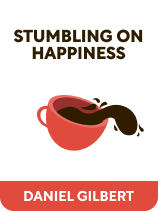

This article is an excerpt from the Shortform book guide to "Stumbling on Happiness" by Daniel Gilbert. Shortform has the world's best summaries and analyses of books you should be reading.
Like this article? Sign up for a free trial here .
Have you tried to talk about happiness but don’t know how to describe it? What two propositions did Daniel Gilbert give on how to discuss happiness?
Daniel Gilbert is an award-winning writer, teacher, and researcher in social psychology. In his book Stumbling on Happiness, Gilbert points out why it’s difficult to talk about happiness. He proposes two methods for discussing happiness despite the difficulties.
Here’s how to have a constructive talk about happiness.
Discussing Happiness
According to Gilbert, a major reason why it’s difficult to talk about happiness is that you can’t describe it unless you reference something else. You can talk about happiness only by saying what makes you happy or what happiness is like. You cannot concretely say what happiness itself is.
For instance, you might explain to a friend that the happiness you felt when your fiancé proposed was like the feeling of awakening to a warm spring morning, or you might show them a picture of your delighted face in an engagement photo. You can’t, however, describe your happiness without these references.
How to Talk About Happiness Despite These Difficulties
Now that we’ve covered the ways in which Gilbert believes the act of talking about happiness is inherently difficult, you might be asking yourself why we should try to do so at all. While Gilbert acknowledges the challenges involved in doing so, he claims we can still have a constructive talk about happiness and presents two propositions on how to do this:
Proposition #1: We Should Rely on Firsthand Accounts of Happiness
Though our attempts to talk about happiness will always be flawed, Gilbert writes that they will be least flawed if we rely on accounts of happiness by the people experiencing it—not by observers. Someone eating a cookie is better able to describe the happiness of eating a cookie than the person watching them eat a cookie, for instance.
(Shortform note: There are both advantages, as Gilbert points out, and disadvantages to using self-reported data on happiness—or, indeed, anything. Common disadvantages include people (particularly experiment subjects) giving responses they think are socially acceptable, rather than honest. For instance, when asked if a picture of a smiling baby makes them happy, a subject may answer “yes” because they think that’s the acceptable response, even if it’s not true. Subjects can also interpret questions differently, leading to incomparable data. For example, someone might interpret a question as being about their general level of happiness, while another subject might interpret the same question as referring to their present happiness.)
Proposition #2: Large Numbers of Similar Experiences Are Reasonably Accurate
Additionally, Gilbert states that when large numbers of people report the same experience of happiness, we can take that experience to be reasonably accurate—this is commonly known as the law of large numbers. In formulating his principles about happiness, Gilbert, therefore, relies on ideas and definitions of happiness that large sample sizes of people commonly agree upon.
| The Law of Large Numbers in AI Medicine The law of large numbers has applications beyond understanding human behavior, as Gilbert proposes here. In artificial intelligence, for instance, scientists use it to suggest the best course of treatment for a certain condition. AI first picks out relevant information about treatments and their success rates from a vast array of medical records. It then sorts that information based on patterns it detects: for instance, which treatments were the most successful in certain circumstances. Finally, it proposes the treatment most likely to succeed for a specific patient based on the information it found and categorized. It’s only by using the law of large numbers—and the idea that the shared results of large numbers of similar treatment experiences tend to be accurate—that AI can recommend treatments effectively. |

———End of Preview———
Like what you just read? Read the rest of the world's best book summary and analysis of Daniel Gilbert's "Stumbling on Happiness" at Shortform .
Here's what you'll find in our full Stumbling on Happiness summary :
- A look at how your brain fabricates your reality leading you to make bad decisions
- The six specific types of bad choices people make
- How to improve your decision-making in the future






